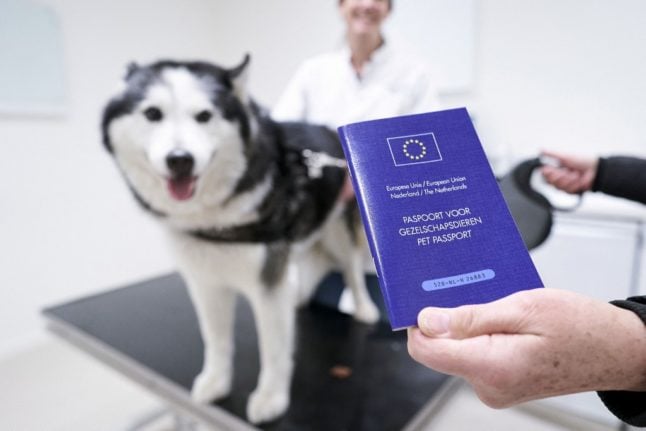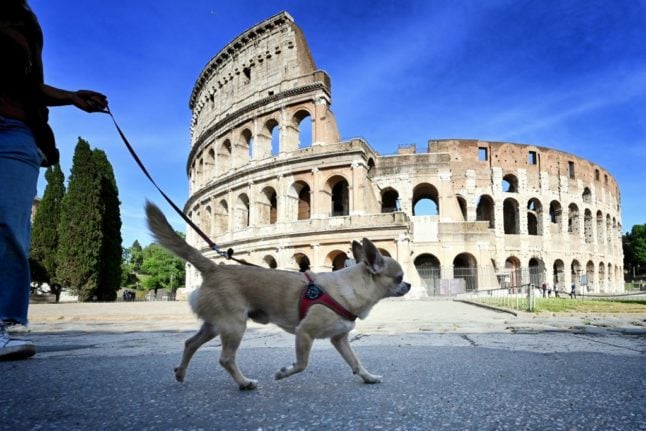Five things to know if you're moving to Italy with your dog

Each country has its own rules and distinct culture when it comes to pets. Here's what you need to know if you're planning on moving to Italy with your canine companion.
Moving countries is an exciting but often nerve-wracking process - and wondering how your pet will react to the move and how they will be treated on arrival can sometimes compound your fears.
But once you've sorted out the admin and travel, relocating your dog to Italy needn't be particularly stressful; and you may even find some aspects of Italian culture to be more dog-friendly than what you're used to back home.
Here's are five things to consider if you're thinking of bringing your dog to Italy.
You'll need a microchip and an animal health certificate...
All dogs in Italy and those moving to Italy must be microchipped - or have a clearly legible tattoo, if applied before July 3rd 2011.
Dogs travelling to Italy from inside the EU will need an EU pet passport, while those coming from outside the bloc (this now includes the UK) will need an animal health certificate, or AHC.
READ ALSO: What you need to know about microchipping your pet in Italy
To get an AHC, you should visit your vet no more than 10 days before travel to the EU. The certificate will contain specific information including contact details, your pet’s health status and vaccination records.
The certificate lasts for four months from the date of issue (or until the rabies vaccine expires, whichever comes first) and is valid for travel between EU countries.
Once in the EU, you can apply for a pet passport, which allows your pet to move freely within the EU. It will contain your dog's microchip number, vaccination status, and show that your pet has a valid rabies vaccination.
...And to register your pet on arrival
When you arrive in Italy, you must register your dog with the regional anagrafe degli animali d'affezione (pet registry, also referred to as the anagrafe canina or dog registry), which records your pet's microchip number along with your contact details.
READ ALSO: How to adopt a pet from an Italian animal shelter

A dog with a Dutch EU pet passport. Once you've registered your dog in Italy, you'll be able to apply for one of these. Photo by Phil NIJHUIS / ANP / AFP.
You can register your dog either at the veterinary services (Servizi Veterinari) section of your Local Health Authority ASL (Azienda Sanitaria Locale), or at any private or public veterinary office.
Each Italian region has its own time limit for registering your dog; exceeding this deadline will incur a fine.
READ ALSO: From barking to cleaning: The culture shocks to expect if you own a dog in Italy
The administrative fee for the registration is €30, and you'll need to provide proof of your identity, proof of the dog's vaccination history and their microchip number, and your own codice fiscale (tax code), which can easily be obtained from your nearest Agenzia delle Entrate tax office (read more about that here).
Doggie day care centres are rare
...though not non-existent. In larger Italian cities you're likely to find at least one doggie day care.
Proceed with caution, however: a number of centres are known to leave their furry charges to their own devices all day in a large fenced area, without much in the way of care or supervision.
The same holds true for boarding houses, where dogs are sometimes chained up and left in small kennels at night and allowed out only sporadically during the day. If a place's rates are impressively low, there's usually a reason why.
If you're considering entrusting your dog to a day care provider or boarding facility, do your research.
Make sure to request a thorough tour of the grounds, and ask the manager for details on exactly what kind of program they offer. Check online reviews, and try to speak with current clients to get references.
Dog sitters and walkers are an option
If you don't find a day or residential facility you feel comfortable with, a better option might be a dog walker and/or sitter.
Sites like Rover or Pawshake are becoming increasingly popular in Italy, allowing you test out various dog walkers in your neighbourhood.

Finding a trusted dogwalker in Italy shouldn't be a problem. Photo by Alberto PIZZOLI / AFP.
Options vary widely, from university students looking to make a bit of extra money on the side on the lower end of the price range (if your dog is fairly low maintenance), to professional dog trainers on the upper end, if you require more experience.
You can pick your walker based on previous client reviews, and some sites even GPS-track your dog's walk so you can see exactly where they've been.
Dogs are (generally) welcome
Despite not being as pet-friendly as other European and North American countries in several respects, Italy is comparatively tolerant when it comes to bringing dogs into restaurants and on public transport.
Most cafes and restaurants will allow you to bring a small-to-medium-sized dog into their establishment - though you should always call ahead to confirm first (if you have a medium-to-large dog they will usually want you to confirm that it's buono, or well-behaved).
READ ALSO: Do renters in Italy have the right to keep pets?
Dogs can also travel on metro, tram, bus and train services in most areas provided they are on a leash and the owner at least has a muzzle to hand - though each city has its own terms and conditions.
On trains and ferries, you will need to buy your large dog their own ticket; smaller dogs that can fit into carriers can sometimes travel for free. You will also need your dog's registration certificate and health booklet.
Find Trenitalia's pet rules here.
Comments (1)
See Also
Moving countries is an exciting but often nerve-wracking process - and wondering how your pet will react to the move and how they will be treated on arrival can sometimes compound your fears.
But once you've sorted out the admin and travel, relocating your dog to Italy needn't be particularly stressful; and you may even find some aspects of Italian culture to be more dog-friendly than what you're used to back home.
Here's are five things to consider if you're thinking of bringing your dog to Italy.
You'll need a microchip and an animal health certificate...
All dogs in Italy and those moving to Italy must be microchipped - or have a clearly legible tattoo, if applied before July 3rd 2011.
Dogs travelling to Italy from inside the EU will need an EU pet passport, while those coming from outside the bloc (this now includes the UK) will need an animal health certificate, or AHC.
READ ALSO: What you need to know about microchipping your pet in Italy
To get an AHC, you should visit your vet no more than 10 days before travel to the EU. The certificate will contain specific information including contact details, your pet’s health status and vaccination records.
The certificate lasts for four months from the date of issue (or until the rabies vaccine expires, whichever comes first) and is valid for travel between EU countries.
Once in the EU, you can apply for a pet passport, which allows your pet to move freely within the EU. It will contain your dog's microchip number, vaccination status, and show that your pet has a valid rabies vaccination.
...And to register your pet on arrival
When you arrive in Italy, you must register your dog with the regional anagrafe degli animali d'affezione (pet registry, also referred to as the anagrafe canina or dog registry), which records your pet's microchip number along with your contact details.
READ ALSO: How to adopt a pet from an Italian animal shelter

You can register your dog either at the veterinary services (Servizi Veterinari) section of your Local Health Authority ASL (Azienda Sanitaria Locale), or at any private or public veterinary office.
Each Italian region has its own time limit for registering your dog; exceeding this deadline will incur a fine.
READ ALSO: From barking to cleaning: The culture shocks to expect if you own a dog in Italy
The administrative fee for the registration is €30, and you'll need to provide proof of your identity, proof of the dog's vaccination history and their microchip number, and your own codice fiscale (tax code), which can easily be obtained from your nearest Agenzia delle Entrate tax office (read more about that here).
Doggie day care centres are rare
...though not non-existent. In larger Italian cities you're likely to find at least one doggie day care.
Proceed with caution, however: a number of centres are known to leave their furry charges to their own devices all day in a large fenced area, without much in the way of care or supervision.
The same holds true for boarding houses, where dogs are sometimes chained up and left in small kennels at night and allowed out only sporadically during the day. If a place's rates are impressively low, there's usually a reason why.
If you're considering entrusting your dog to a day care provider or boarding facility, do your research.
Make sure to request a thorough tour of the grounds, and ask the manager for details on exactly what kind of program they offer. Check online reviews, and try to speak with current clients to get references.
Dog sitters and walkers are an option
If you don't find a day or residential facility you feel comfortable with, a better option might be a dog walker and/or sitter.
Sites like Rover or Pawshake are becoming increasingly popular in Italy, allowing you test out various dog walkers in your neighbourhood.

Options vary widely, from university students looking to make a bit of extra money on the side on the lower end of the price range (if your dog is fairly low maintenance), to professional dog trainers on the upper end, if you require more experience.
You can pick your walker based on previous client reviews, and some sites even GPS-track your dog's walk so you can see exactly where they've been.
Dogs are (generally) welcome
Despite not being as pet-friendly as other European and North American countries in several respects, Italy is comparatively tolerant when it comes to bringing dogs into restaurants and on public transport.
Most cafes and restaurants will allow you to bring a small-to-medium-sized dog into their establishment - though you should always call ahead to confirm first (if you have a medium-to-large dog they will usually want you to confirm that it's buono, or well-behaved).
READ ALSO: Do renters in Italy have the right to keep pets?
Dogs can also travel on metro, tram, bus and train services in most areas provided they are on a leash and the owner at least has a muzzle to hand - though each city has its own terms and conditions.
On trains and ferries, you will need to buy your large dog their own ticket; smaller dogs that can fit into carriers can sometimes travel for free. You will also need your dog's registration certificate and health booklet.
Find Trenitalia's pet rules here.
Join the conversation in our comments section below. Share your own views and experience and if you have a question or suggestion for our journalists then email us at [email protected].
Please keep comments civil, constructive and on topic – and make sure to read our terms of use before getting involved.
Please log in here to leave a comment.